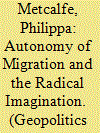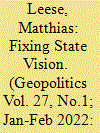|
|
|
Sort Order |
|
|
|
Items / Page
|
|
|
|
|
|
|
| Srl | Item |
| 1 |
ID:
184311


|
|
|
|
|
| Summary/Abstract |
This paper discusses biometric borders in Europe, focusing on the Eurodac database and practises of fingerprinting people on the move in Greece as a politicised attempt to control and limit secondary movement as set out in the Dublin Regulation. The paper presents empirical research to explore one way in which migrants in Athens negotiate Eurodac; where alternative imaginaries informed ideas of ‘big’ and ‘small’ fingerprints, shaping interactions with the asylum service as well as secondary movement. I use Autonomy of Migration (AoM) theories to depict borders as places of ongoing conflict, subjectivity and transformation and introduce the work of Castoriadis’ social imaginaries and the radical imagination to explore migrants’ alternative imaginaries. I argue that these occur at points of friction, within the constraints of, and alongside, a dominant socio-technical imaginary driving the proliferation of biometric border controls. I believe this enables a deeper understanding of the autonomy with AoM theories. Here, autonomy is presented as instances of self-creation, spurred on through the radical imagination and shaping moments of uncontrollability, where the subjective dimension of migration informs both meanings of autonomy as well as alternative imaginaries. Ultimately, I argue that these practices seek to disrupt and challenge the dominance of biometrics as a signifier of control, identity and truth.
|
|
|
|
|
|
|
|
|
|
|
|
|
|
|
|
| 2 |
ID:
184322


|
|
|
|
|
| Summary/Abstract |
The idea of Chile as a ‘bridge country’ that connects – or should connect – Latin America with the Asia-Pacific region has guided its commercial diplomacy since the early 1990s. We argue that this geopolitical vision corresponds closely with what network analysts describe as a ‘broker’: an actor that bridges ‘structural holes’ by connecting otherwise disconnected actors or groups of actors. As a relational approach, social network analysis provides an alternative way of thinking about Chile’s position in international relations that does not rely on preconceived groupings or rank orders based on country attributes, as in the case of ‘middle powers’ and ‘small states.’ Further, the approach allows us to empirically explore which countries of the Pacific Basin currently perform such a role and whether (and when) Chile conforms to the theoretical expectations of a ‘transpacific broker.’ Using network data on commercial agreements (1980–2018), we trace Chile’s emergence as a transpacific broker and discuss how its commercial diplomacy provided the country with leverage in this regard. In doing so, the study sheds light on the opportunities and limitations of peripheral actors seeking to gain social capital through networks of relations.
|
|
|
|
|
|
|
|
|
|
|
|
|
|
|
|
| 3 |
ID:
184316


|
|
|
|
|
| Summary/Abstract |
This article focuses on the Schengen Information System (SIS II) – the largest data infrastructure supporting police cooperation and border controls in the European Union. Through the SIS II, national authorities exchange information about individuals and objects, and this across national and institutional boundaries. Yet, the SIS II does not always perform as anticipated in its design scripts. Following common threads about infrastructural politics across Science and Technology Studies, political geography and critical security studies, we explore fragility and maintenance as being intrinsic to the functioning of data infrastructures and crucial sites of governance. We show how the SIS II is kept under continuous control to operate as a controlling data infrastructure. This article contributes to a critical inquiry into the datafication of border controls by interrogating how data acquire the status of allegedly credible and accurate information. Ultimately, this approach pinpoints the inherent fragility of seemingly mighty data infrastructures and casts a light on those actors and processes that sustain, through maintenance, contemporary digital borders.
|
|
|
|
|
|
|
|
|
|
|
|
|
|
|
|
| 4 |
ID:
184309


|
|
|
|
|
| Summary/Abstract |
Data matter more than ever in the regulation of borders and migration. An apt illustration of how movement is enabled or restricted by data collection and analytics was recently reported by Eyal Weizman, founding director of the London-based research agency Forensic Architecture that specialises in the production and analysis of evidence about human rights violations by state and corporate actors. Prior to a business trip to Miami where he was supposed to open Forensic Architecture’s first major exhibition in the US that, among other things, displayed investigations into a CIA drone strike in Pakistan and police killings of black US citizens, Weizmann was notified that his visa waiver request had been denied and that he would not be allowed to enter the United States.
|
|
|
|
|
|
|
|
|
|
|
|
|
|
|
|
| 5 |
ID:
184313


|
|
|
|
|
| Summary/Abstract |
This article examines the deployment of drones by state and non-state actors at the southern maritime European borders. By focusing on the conflation of humanitarian and security rationales in the use of this border technology, the article unfolds around the notion of the multipurpose drone. A notion that encompasses the diverse logics, actors and practices that merge in the development and use of border drones by EU agencies and humanitarian NGOs. The article argues that the character of the multipurpose drone depends on various aspects including the actions taken in response to the data gathered by it. While the data collected by drones can contribute to the better conduct of search and rescue operations, drones can also create further risks for irregular migrants. This article contends, therefore, that the presence of drones at EU borders raises critical questions and moral dilemmas regarding the challenges and opportunities they pose for migrants and refugees. It also analyses the transparency and responsibility aspects associated with drones used in border operations and the blurring of civil and military, public and private in their deployment.
|
|
|
|
|
|
|
|
|
|
|
|
|
|
|
|
| 6 |
ID:
184310


|
|
|
|
|
| Summary/Abstract |
The use of digital devices and the collection of digital data have become pervasive in borderzones. Whether deployed by state or non-state actors, digital devices are rolled out despite intense criticism and controversy. In this article, I propose to approach these interventions through the prism of experimentality. Experimentality was initially formulated in the anthropological literature on the globalisation of clinical trials and, more recently, revisited in feminist science and technology studies. Drawing on this work, I argue that experimentality has become a rationality of governing in borderzones, which renders social relations continuously decomposable and recomposable by inserting mundane (digital) devices into the world. The introduction of various digital devices in Greece since 2015, starting with Skype for the pre-registration of asylum seekers, helps shed light on a particular form of governing through experiments without protocol. This form of experimentality has specific political effects for migrants’ lives. Firstly, experimentality builds upon and intensifies neoliberalism by rearranging rather than redressing precarity. In so doing, experimentality through digital devices produces debilitation rather than better connectivity or access to asylum. Secondly, migrants become not only subjects of surveillance, but subjects of extraction of ‘surplus data’ which entangles their lives into the circuits of digital platforms.
|
|
|
|
|
|
|
|
|
|
|
|
|
|
|
|
| 7 |
ID:
184312


|
|
|
|
|
| Summary/Abstract |
This paper deals with data extraction and data circulation that are at stake in refugee governmentality with a focus on the Cash Assistance Programme in Greece. It focuses on the data extraction activities which are part of the cash Assistance Programme and on the ways in which data is shared and not shared among the actors involved. It starts by critically engaging with debates on techno-humanitarianism in refugee governmentality, and it moves on by drawing attention to the constitutive dynamics between data abundance and data disregard. Then, it analyses the extent to which different actors can access and act upon the data. The second part of the article centres on the peculiar modes of subjectivation that asylum seekers are shaped by, as cards beneficiaries and techno-users. It shows that asylum seekers are both passive surfaces of data extraction and, at the same time, are object of a request to speak and to produce data and feedback about their use of the card. The paper concludes with a section about the injunction imposed on asylum seekers to act as autonomous and responsible techno-users and, at the same time, to comply with multiple spatial restrictions.
|
|
|
|
|
|
|
|
|
|
|
|
|
|
|
|
| 8 |
ID:
184314


|
|
|
|
|
| Summary/Abstract |
Building on Scott’s notion of identity as a key concept in early modern statehood, this paper historically contextualises and analyses the current political re-problematisation of identity in the EU. Engaging the recently adopted interoperability initiative that is set to biometrically verify and cross-validate identity records between all European border management, migration, and security databases, it argues that interoperability presents a shift from traditional modes of identity production at the border towards a digital space of identity management. Such identity management is predicated on the establishment of a biometric super-layer structure that cuts across databases without dissolving their legal foundations and introduces a new mode of ‘truth’ production in the form of a dedicated ‘identity confirmation file’ that is supposed to re-introduce a reliable baseline for the government of the Schengen area.
|
|
|
|
|
|
|
|
|
|
|
|
|
|
|
|
| 9 |
ID:
184321


|
|
|
|
|
| Summary/Abstract |
Much of Northern Ireland remains divided as it continues to transition from a prolonged ethno-national struggle during a period of violence known as “the Troubles” (1969–1998). This conflict resulted in the loss of thousands of lives, residential segregation and the construction of “peace walls” that separate the two ethno-national communities (i.e. “Catholic”/republican and “Protestant”/loyalist) in parts of many of its cities and towns. Residential segregation and violent national projects in cities such as Belfast not only reflect wider regional national tensions; they often are the foundation from which the ethno-national conflicts first emerged and continue to persist and reinforce the non-inclusionary fissures between two communities. Exclusionary national ideologies, narratives and practices, manifested through parading, sectarian political murals and residential segregation demonstrate how many embody a restrictive vision of national identity. However, there are a few notable exceptions to these discriminatory practices – one of which is the subject of this paper. 174 Trust is a community centre in the divided northwest side of Belfast that is designed and dedicated to providing an inclusive, safe and “shared” place to foster a new form of civic nationalism. Through an analysis of their contemporary efforts to transform exclusionary historical expressions of nationalism by fostering a shared civic nationalism, this paper interrogates nationalism by focusing on a significant grassroots effort that may be overlooked in general investigations. As I suggest, the lessons offered by this community centre exemplify the potential of a micro-political approach and serve as a powerful model for future development within this and other divided communities.
|
|
|
|
|
|
|
|
|
|
|
|
|
|
|
|
| 10 |
ID:
184319


|
|
|
|
|
| Summary/Abstract |
This paper traces emerging legal-spatial practices of exclusion of trafficked migrant fishers from the human and labour rights protections of anti-trafficking. I introduce the idea of jurisdictional exceptionalism – that is practices that invoke particular demarcations of sovereignty to avoid protection responsibilities – to conceptualise these geographies of exclusion. Singapore, as a transit state for trafficked migrant fishers and location of labour agencies managing their contracts, is drawn on to illustrate one key spatial tactic of jurisdictional exceptionalism; namely, deflection. The discussion engages with recent critical and feminist geopolitical insights concerning the production and perpetuation of (in)security through legal-geographical exclusions.
|
|
|
|
|
|
|
|
|
|
|
|
|
|
|
|
| 11 |
ID:
184317


|
|
|
|
|
| Summary/Abstract |
This article analyses the pornographic genre of ‘border sex’, set on the US-Mexico border and produced in the US, which depicts uneven power relations taking shape at and through the border. I posit an interpretation of these representations that focuses on the use of institutionalised violence as a means of exerting control over female migrants’ bodies, reasserting a gendered territorial authority. This interpretation also highlights the intersectional aspects of inequalities and I propose an understanding of the embodiment of control and the US-Mexico border that shows the importance and potential of the theoretical and analytical tools of feminist geography to contribute to the critical border studies literature. Moreover, the article places itself in the tradition of popular geopolitics and plugs a gap in this stream of research and literature regarding online pornography and its importance in shaping imaginaries, not only with regard to sexual relations. This work draws on various theoretical traditions and analytical approaches to cover issues related to borders and border crossing from a feminist geopolitical standpoint, with a particular interest in the increasing embodiment of migration control in pornographic popular representations and in the intersection of various forms of inequality at the border.
|
|
|
|
|
|
|
|
|
|
|
|
|
|
|
|
| 12 |
ID:
184323


|
|
|
|
|
| Summary/Abstract |
Project Kraken, an effort to combat terrorism and crime on the UK water network, is a valuable case that propels knowledge of surveillance. Whilst similar initiatives universalize surveillance participation, Kraken particularises it, occupying specific spaces and recruiting a delimited (maritime) community. Research observed, on one hand, Kraken’s spatial liminality, given its occupation of the land/water threshold, characterized by ‘edges’ through which humans, thought, and resources flow. On the other, agential liminality was observed given Kraken’s enlistment of the maritime community: ever ‘on the edge’ of land/water, peripheral to national security, yet endowed with knowledge useable by state. A marginal actor recruited ‘inwards,’ that community possesses a watery consciousness harnessed for raison d’état. Liminality offers a lens through which to assess such particularisation. A liminal approach, foregrounding the edge, helps overcome the binaries of inside/outside, land/water, offering fertile territory on which to revision power flows and more accurately situate the powerful and powerless in contemporary social science.
|
|
|
|
|
|
|
|
|
|
|
|
|
|
|
|
| 13 |
ID:
184320


|
|
|
|
|
| Summary/Abstract |
The past several decades, significant theoretical, epistemological and methodological changes occurred in border research. In addition to their traditional territorial geo-political conception, borders now manifest themselves in more abstract and symbolic dimensions within geopolitical borderlands and beyond, in different cultural settings, and through a diversity of interpersonal and inter-group encounters. This article contributes to border research by proposing to study manifestations of borders and border experiences, using a variety of visual research methods. While the field of visual research itself has become vast and multidisciplinary, applications with respect to border studies remain quite limited. Yet, borders have spread and diversified, and searching for their concrete materializations, as well as involving people to share their border-related experiences, are ways to make them more tangible. Therefore, this contribution presents a systematic account of ways to use visuals and visual media to produce and trigger data and insights on border related matters.
|
|
|
|
|
|
|
|
|
|
|
|
|
|
|
|
| 14 |
ID:
184315


|
|
|
|
|
| Summary/Abstract |
This paper critically examines the implications of ‘self-sovereign identity’ (SSI) for border politics and migration management. SSI refers to user-controlled, decentralised forms of digital identification. Closely linked with the distributed ledger technology blockchain, SSI is presented by advocates as a tool to empower marginalised groups, including refugees. Among other benefits, some claim that SSI removes the need for powerful, centralised institutional structures by giving individuals control and ownership of their identity information. However, through ethnographic research in an international aid organisation, I find that SSI is an embryonic technology with indeterminate properties and benefits. I identify a series of competing logics in the debates around SSI’s emancipatory potential, which relate to four issues: (i) the neutrality of the technology, (ii) the capacities of refugees, (iii) global governance and the nation state, and (iv) new economic models for digital identity. SSI is simultaneously the potential enabler of new modes of empowerment, autonomy and data security for refugees and a means of maintaining and extending bureaucratic and commercial power. I situate SSI in a genealogy of systems of identity control and argue that, in practice, it is likely to feed into the powers of corporations and states over refugee populations.
|
|
|
|
|
|
|
|
|
|
|
|
|
|
|
|
| 15 |
ID:
184318


|
|
|
|
|
| Summary/Abstract |
The presented paper revisits the theory of Carl Schmitt from the perspective of border barrier building and applies it to three cases of barriers in the Middle East. It firstly introduces the term nomos as a territorial order that is the basis for all law and is particular to each state. Then, it argues that states build border barriers in order to create or maintain this nomos while facing challenges from hard-to-identify enemies. The process-tracing analysis of the events leading up to a construction of a border barrier and its immediate outcomes in the cases of Morocco, Tunisia and Turkey concludes that these border barriers were built in order to help create or protect the nomos, both through delimitation of space and through identification of enemies challenging it. The outcome of this research suggests that the Schmittian theory might be useful in the analysis of the border barrier construction, but further research is needed to confirm this.
|
|
|
|
|
|
|
|
|
|
|
|
|
|
|
|
|
|
|
|
|